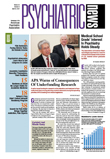More than a dozen genes have been linked with schizophrenia, and the findings replicated, Daniel Weinberger, M.D., told Psychiatric News recently. Weinberger is director of the Genes, Cognition, and Psychosis Program at the National Institute of Mental Health.
Most of the genes, he explained, were identified via linkage analysis, in which genes from family members with and without schizophrenia were compared. However, he predicted that more genes underlying schizophrenia will probably be identified once scientists start using a new technique called whole-genome association (WGA). This allows a researcher to rapidly scan the entire genome of individuals with schizophrenia, as well as of control subjects, for particular snips of genetic material and then to compare results for the two groups.
Indeed, it looks as if Weinberger's prediction is coming true. Todd Lencz, Ph.D., of Zucker Hillside Hospital and the Feinstein Institute for Medical Research in Glen Oaks, N.Y., and colleagues have used WGA to link yet another gene to schizophrenia. They reported their finding in the March 20 Molecular Psychiatry.
Lencz and his colleagues deployed WGA to scan the entire genomes of 178 individuals with schizophrenia and 144 healthy control subjects for some 500,000 fragments of genetic material. They found that a particular fragment was three times more common in the schizophrenia subjects than in the controls. The fragment, called rs4129148, is located on both the X and Y chromosomes and, most intriguingly, is located next to two genes known to make receptors for cytokines. Cytokines are produced by cells for cell-to-cell communication and are critical to the body's immune responses. Cytokine abnormalities have been associated with some cancers and inflammatory autoimmune disorders.
Thus, if rs4129148, like the genes next to it, makes a cytokine receptor, it would implicate the immune system in schizophrenia. Many of the other genes tied to schizophrenia, in contrast, seem to impact basic processes of brain development such as neuronal differentiation and neuronal plasticity.
And if rs4129148 makes a cytokine receptor, it might explain some of the putative environmental inputs into schizophrenia, Lencz and his group suggested.
For instance, well-replicated findings of heightened schizophrenia risk for winter-born and urban-born-or-dwelling persons, combined with large studies demonstrating increased schizophrenia risk following maternal exposure to various infectious pathogens, suggest that prenatal infection is a potent environmental risk factor for schizophrenia.
But simply being exposed to a prenatal infection may not be sufficient to trigger schizophrenia; susceptibility genes that allow infectious agents to damage the brain may also be involved. And one of these susceptibility genes may be rs4129148.
Or as Anil Malhotra, M.D., the study's senior investigator, pointed out in a press release, “A role for cytokines could help explain why prenatal exposure to viruses is a risk factor for schizophrenia, thus providing a bridge between genetic risk and environmental exposures.” Malhotra, like Lencz, is affiliated with Zucker Hillside and the Feinstein research institute.
Still other evidence underscores the possibility that schizophrenia may be, at least in part, an illness of a cytokine system gone awry. For example, abnormally high levels of pro-inflammatory cytokines have been found in the blood and cerebrospinal fluid of individuals with schizophrenia.
“As with any genetic-association study, additional independent replications from other laboratories will be critical to confirm these novel findings,” Lencz and colleagues concluded.
The research was funded by the Donald and Barbara Zucker Foundation, KeySpan Energy, the National Institute of Mental Health, NARSAD, the Mental Health Research Association, and the Stanley Medical Research Institute.
“Converging Evidence for a Pseudoautosomal Cytokine Receptor Gene Locus in Schizophrenia” is posted at<www.nature.com/mp/journal/vaop/ncurrent/index.html>.▪
